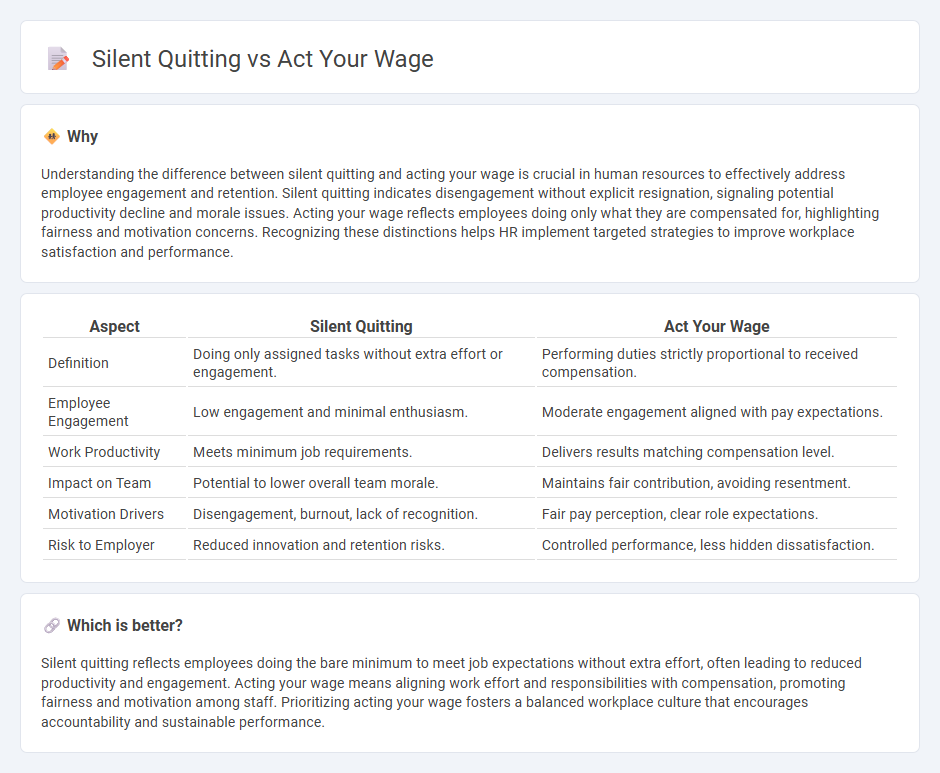
Silent quitting, also known as quiet quitting, refers to employees doing the bare minimum required by their job descriptions, avoiding extra tasks or overtime without formal resignation. In contrast, "act your wage" emphasizes aligning effort and productivity with compensation, where employees adjust their work intensity to match their salary level. Explore these workplace behaviors to understand their impact on employee engagement and organizational culture.
Why it is important
Understanding the difference between silent quitting and acting your wage is crucial in human resources to effectively address employee engagement and retention. Silent quitting indicates disengagement without explicit resignation, signaling potential productivity decline and morale issues. Acting your wage reflects employees doing only what they are compensated for, highlighting fairness and motivation concerns. Recognizing these distinctions helps HR implement targeted strategies to improve workplace satisfaction and performance.
Comparison Table
| Aspect | Silent Quitting | Act Your Wage |
|---|---|---|
| Definition | Doing only assigned tasks without extra effort or engagement. | Performing duties strictly proportional to received compensation. |
| Employee Engagement | Low engagement and minimal enthusiasm. | Moderate engagement aligned with pay expectations. |
| Work Productivity | Meets minimum job requirements. | Delivers results matching compensation level. |
| Impact on Team | Potential to lower overall team morale. | Maintains fair contribution, avoiding resentment. |
| Motivation Drivers | Disengagement, burnout, lack of recognition. | Fair pay perception, clear role expectations. |
| Risk to Employer | Reduced innovation and retention risks. | Controlled performance, less hidden dissatisfaction. |
Which is better?
Silent quitting reflects employees doing the bare minimum to meet job expectations without extra effort, often leading to reduced productivity and engagement. Acting your wage means aligning work effort and responsibilities with compensation, promoting fairness and motivation among staff. Prioritizing acting your wage fosters a balanced workplace culture that encourages accountability and sustainable performance.
Connection
Silent quitting reflects employees doing the minimum required tasks without extra effort, directly linked to the concept of "act your wage," where workers align their effort with perceived compensation fairness. This phenomenon signals dissatisfaction with wages or workplace recognition, often leading to reduced productivity and engagement. Human Resources must address compensation strategies and employee motivation to mitigate silent quitting and maintain organizational performance.
Key Terms
Employee Engagement
Employee engagement significantly influences the phenomena of "act your wage" and silent quitting, where disengaged employees limit effort to match compensation or withdraw emotionally without overt resignation. Research shows companies with high engagement levels report 21% greater profitability and 41% lower absenteeism, highlighting the cost of disengagement. Discover strategies to boost commitment and reduce silent quitting for a productive workforce.
Work-Life Balance
Act your wage emphasizes negotiating compensation that reflects your skills and contributions, ensuring financial fairness supports a sustainable work-life balance. Silent quitting involves limiting effort to job descriptions to prevent burnout while maintaining mental health and personal time boundaries. Explore effective strategies to balance productivity and well-being in today's work environment.
Discretionary Effort
Discretionary effort represents the extra energy and commitment employees voluntarily invest beyond their basic job requirements, often influenced by perceived fairness in compensation. Acting on wage concerns can motivate workers to seek improvements in pay, enhancing their discretionary effort, while silent quitting reflects a withdrawal of this effort due to dissatisfaction. Explore strategies to balance wage expectations and sustain discretionary effort for improved workplace engagement.
Source and External Links
Why 'Act Your Wage' Is Scary - Korn Ferry - The phrase "act your wage" reflects employees' reluctance to do extra work without additional pay, signaling potential challenges in motivating workforce engagement and ambition.
What Should Employers Do About the "Act Your Wage" Trend? - The "Act Your Wage" movement encourages employees to recognize their worth and set boundaries, only undertaking extra tasks if appropriately compensated or recognized.
What Does It Mean To Act Your Wage? Trend, Explained - Hive - Acting your wage means establishing boundaries at work to avoid doing more than is compensated, effectively maintaining a work-life balance without overextending effort beyond one's pay.
 dowidth.com
dowidth.com